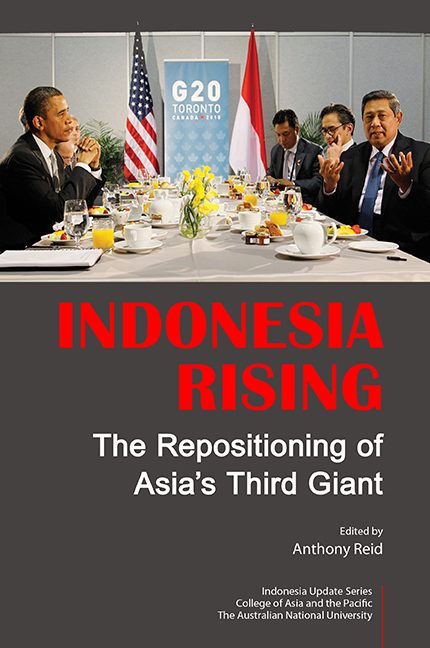Book contents
- Frontmatter
- Contents
- Tables
- Figures
- Contributors
- Foreword by Gareth Evans
- Preface
- Glossary
- 1 Indonesia's New Prominence in the World
- 2 Indonesia in the New World Balance
- 3 Indonesia's Role in the World Economy: Sitting on the Fence
- 4 Is Indonesia Rising? It Depends
- 5 Domestic Politics and International Posture: Constraints and Possibilities
- 6 Can Indonesia Lead on Climate Change?
- 7 Indonesian Muslims and Their Place in the Larger World of Islam
- 8 Indonesia's Quiet Springtime: Knowledge, Policy and Reform
- 9 Problems of Identity and Legitimacy for Indonesia's Place in the World
- Index
- INDONESIA UPDATE SERIES
3 - Indonesia's Role in the World Economy: Sitting on the Fence
Published online by Cambridge University Press: 21 October 2015
- Frontmatter
- Contents
- Tables
- Figures
- Contributors
- Foreword by Gareth Evans
- Preface
- Glossary
- 1 Indonesia's New Prominence in the World
- 2 Indonesia in the New World Balance
- 3 Indonesia's Role in the World Economy: Sitting on the Fence
- 4 Is Indonesia Rising? It Depends
- 5 Domestic Politics and International Posture: Constraints and Possibilities
- 6 Can Indonesia Lead on Climate Change?
- 7 Indonesian Muslims and Their Place in the Larger World of Islam
- 8 Indonesia's Quiet Springtime: Knowledge, Policy and Reform
- 9 Problems of Identity and Legitimacy for Indonesia's Place in the World
- Index
- INDONESIA UPDATE SERIES
Summary
A friend once told me that Indonesia is a ‘disappointing’ country: it disappoints optimists because it never reaches its full potential, and it disappoints pessimists because they expect it to collapse at any moment. I think there is some truth in this joke. Indonesia is indeed a country that oscillates between optimism and pessimism.
It is a similar story with trade policy. As an archipelago made up of more than 17,000 islands, Indonesia naturally evolved as a free trader. Indonesian history is a history of trade. Yet the country's politicians, media and even academics are reluctant to openly embrace globalization and free trade. Indonesia also has a contradictory attitude towards international institutions: it deeply distrusts institutions such as the IMF and the World Bank yet is very enthusiastic about and participates actively in the G20 and the Association of Southeast Asian Nations (ASEAN).
Indonesia's active participation in the G20 is seen as one of the successes of Susilo Bambang Yudhoyono's presidency. During a meeting of G20 leaders in Pittsburgh, the president proudly shared Indonesia's experience with far-reaching policy changes in 2005 and 2008 that raised fuel prices and allocated the extra funding to the poor in the form of cash transfers and health and education programs. This policy had three main benefits: it created fiscal space, which was good for macroeconomic policy; it allowed the government to increase spending on the poor, which was good for income distribution and poverty reduction; and it reduced demand for fossil fuels and therefore carbon emissions, which was good for the environment. The Indonesian president's remarks informed a Pittsburgh communiqué that recommended countries ‘phase out and rationalize … inefficient fossil fuel subsidies while providing targeted support for the poorest’ (G20 2009: 3). But strangely, Indonesia itself is currently extremely hesitant about implementing another round of cuts in fuel subsidies.
Trade policy has swung from one extreme to another over the past 60 years. Indonesia disengaged from trade with the rest of the world in the early 1960s, then shifted to a very open regime later in the decade. The high-growth period from the 1970s to mid-1980s was accompanied by relatively high levels of protection, giving way to deregulation and other trade reforms in the late 1980s and 1990s.
- Type
- Chapter
- Information
- Indonesia RisingThe Repositioning of Asia's Third Giant, pp. 28 - 48Publisher: ISEAS–Yusof Ishak InstitutePrint publication year: 2012

